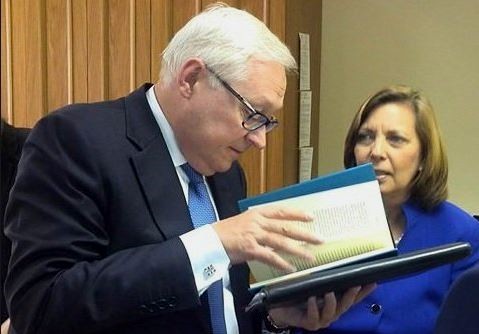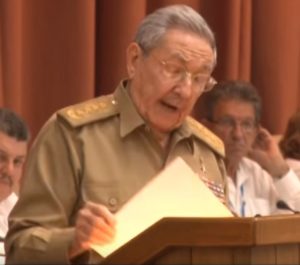
Trump’s intransigence leads Cuba, Russia to throw up their hands, not hold them out
Last Wednesday (July 26), the Cuban Foreign Ministry released a photograph of Josefina Vidal Ferreiro, former head of the ministry’s North American department, meeting in Moscow with Deputy Foreign Minister Sergei Alekseyevich Ryabkov.
There was no press release attached to the picture (at top), only a perfunctory three-paragraph caption that said that “during their cordial encounter, the parties restated the rising development of the friendly relations between Cuba and Russia. Likewise, there was an exchange of opinions about current issues on the international agenda.
“Later,” the caption said, “political consultation took place between the North American / Canadian Department and the Directorate General for the United States of the Russian and Cuban foreign ministries, respectively.”
Apparently, Vidal was making a detour to Moscow on her way to Canada, where she reportedly will become Cuba’s ambassador, and exchanged views with her Russian counterpart.
The announcement on Sunday (July 30) by Russian President Vladimir Putin that the United States needed to recall 755 diplomatic workers from their posts in Russia in reprisal for the expulsion of Russian diplomats by the U.S., and a subsequent interview with ABC News by Ryabkov himself allow me to come to a conclusion:
Both Cuba and Russia have decided that, as long as U.S. President Donald Trump maintains a bellicose stance toward both countries, further attempts to improve relations with Washington will be futile. Far better it will be — the thinking apparently goes — to strengthen the links between Havana and Moscow and move on.
As shown by a transcript of the Ryabkov interview, both capitals have similar reservations — and similar hopes for reconciliation.
“I think the political will is what is needed most in this situation,” the Russian diplomat said. “And I believe there are several areas where U.S. and Russia can and should work together cooperatively: non-proliferation of weapons of mass destruction; countering terrorism; illicit immigration; trafficking in people; climate change, you name it.
“We are ready. We are stretching our hand forward. We are hopeful that someone on the other side, President Trump included, but also others, may see here a chance for a somewhat different way.”

Ryabkov’s words echo those of Cuban President Raúl Castro when he addressed the National Assembly this past July 14.
“The U.S. government has decided to intensify the blockade through the imposition of new obstacles to its business community to trade and invest in Cuba and of additional restrictions to its citizens to travel to our country, justifying such measures with an old and hostile rhetoric, typical of the Cold War,” Castro said at the time.
[The Russian Foreign Ministry had warned on June 18, after Trump halted the U.S.-Cuba thaw, of a return “to the already almost forgotten rhetoric of the Cold War style.”]
“I wish to repeat,” Castro said, “that Cuba is willing to continue to negotiate the bilateral issues pending with the United States on the basis of equality and respect for the sovereignty and independence of our country and to resume a respectful dialogue and cooperation on issues of common interest with the U.S. government.
“Cuba and the United States can cooperate and coexist, respecting their differences and promoting everything that benefits both countries and peoples, but no one should expect that, to do so, Cuba will make concessions that are inherent to its sovereignty and independence,” Castro cautioned, adding that Cuba won’t “negotiate its principles or accept conditions of any type.”
Until Trump reversed many of former President Barack Obama’s efforts to improve relations with Cuba, the negotiators led by Josefina Vidal had reached agreements with the U.S. on travel by Americans, direct flights, illegal emigration, antidrug efforts, the environment and other issues.
Now, Vidal’s team has been told to stand down and Vidal herself has been given another assignment.
This observer’s conclusion: Havana and Moscow have decided to throw up their hands and resign themselves — though reluctantly — to a return to the ugly days of the Cold War.
Emilio Paz, a Cuba-watcher, lives in Miami.

